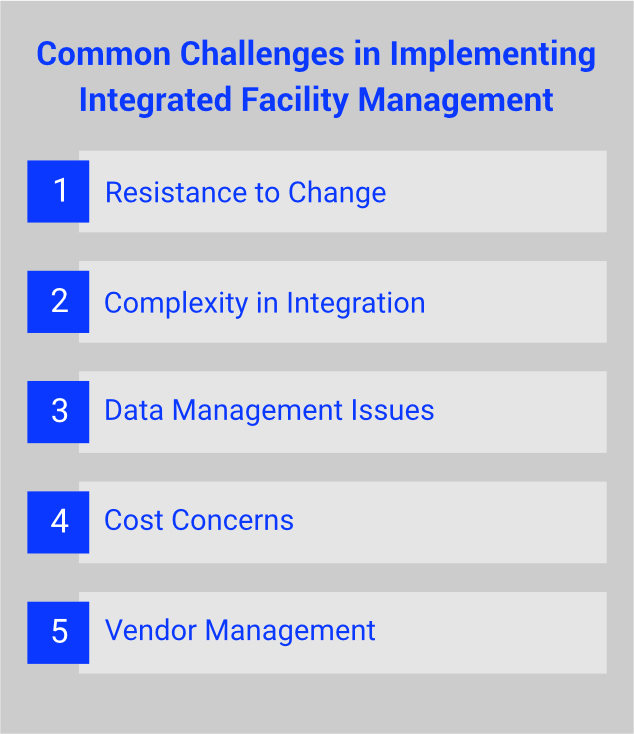Introduction:
Integrated Facility Management (IFM) is a strategic approach that combines all of a company’s facility management services under one contract and management team. It aims to improve operational efficiency, reduce costs, and enhance service delivery. However, the journey to implementing IFM comes with its own set of challenges. This blog explores common obstacles faced by Facility Management Companies in India, offers solutions to overcome them, and presents case studies of successful IFM implementations.
Common Challenges in Implementing Integrated Facility Management

1. Resistance to Change:
One of the primary challenges in adopting IFM is resistance to change from employees and stakeholders. Traditional facility management processes are deeply rooted in many organizations, and shifting to an integrated approach can be met with skepticism.
Solution:
- Stakeholder Engagement: Involve stakeholders early in the planning process. Communicate the benefits of IFM clearly and address any concerns.
- Training Programs: Conduct training sessions to familiarize employees with the new systems and processes. This helps in reducing fear and builds confidence in the new approach.
2. Complexity in Integration:
Integrating multiple services under one management structure is inherently complex. Different services may have varying processes, technologies, and KPIs, making it challenging to streamline operations.
Solution:
- Phased Implementation: Roll out IFM in phases, starting with a pilot project to identify potential issues and refine the process.
- Standardized Procedures: Develop standardized procedures and protocols for all services to ensure consistency and efficiency.
3. Data Management Issues:
Effective IFM relies heavily on accurate data collection and management. Many organizations struggle with fragmented data, outdated systems, and lack of real-time information.
Solution:
- Adopt Advanced Technologies: Utilize Integrated Workplace Management Systems (IWMS) to centralize data and provide real-time insights.
- Data Cleansing: Conduct a thorough data cleansing exercise before integrating systems to ensure accuracy and reliability.
4. Cost Concerns:
The initial investment required for implementing IFM can be a deterrent. Companies often worry about the high costs associated with new technologies, training, and potential disruptions.
Solution:
- Cost-Benefit Analysis: Perform a detailed cost-benefit analysis to showcase the long-term savings and efficiencies gained from IFM.
- Flexible Budgeting: Create a flexible budget that allows for incremental investments, spreading costs over time.
5. Vendor Management:
Managing multiple vendors under a single integrated framework can be challenging. Issues such as conflicting contracts, performance variations, and lack of coordination are common.
Solution:
- Consolidated Vendor Contracts: Consolidate contracts and negotiate unified terms with vendors to streamline management.
- Vendor Performance Management: Implement a vendor performance management system to monitor and evaluate vendor performance regularly.
Case Studies of Successful IFM Implementations
Case Study 1: A Manufacturing Giant in Pune
Challenge: The manufacturing company faced inefficiencies due to fragmented facility management services. Multiple vendors and lack of coordination led to increased costs and operational disruptions.
Solution:
- The company partnered with one of the top facility management companies in India to implement an integrated solution.
- Services such as housekeeping, maintenance, and security were consolidated under a single management team.
- Advanced technologies like IoT sensors and IWMS were deployed for real-time monitoring and data analysis.
Outcome:
- The company reported a 20% reduction in operational costs within the first year.
- Enhanced service quality and reduced downtime improved overall productivity.
Case Study 2: A Corporate Office in Gurugram
Challenge: The corporate office struggled with inconsistent service quality and rising costs due to multiple service providers managing different aspects of facility management.
Solution:
- A comprehensive IFM solution was implemented, consolidating all services under one contract.
- Standardized procedures and performance metrics were established to ensure consistent service delivery.
- Regular training sessions were conducted for in-house staff and vendor teams.
Outcome:
- Service quality improved significantly, with a 15% increase in employee satisfaction scores.
- Cost savings of 18% were achieved through streamlined operations and better resource utilization.
Case Study 3: A Healthcare Facility in Mumbai
Challenge: The healthcare facility faced challenges in maintaining compliance and ensuring the highest standards of hygiene and safety.
Solution:
- An IFM approach was adopted, integrating services like housekeeping, waste management, and maintenance.
- Compliance management tools were implemented to ensure adherence to regulatory standards.
- A dedicated team was appointed to oversee hygiene and safety protocols.
Outcome:
- The facility achieved 100% compliance with health and safety regulations.
- Patient satisfaction increased by 25% due to improved service quality and cleanliness.
Conclusion
Implementing Integrated Facility Management in India is not without its challenges. However, with strategic planning, stakeholder engagement, and the right technologies, these challenges can be effectively overcome. The case studies highlighted demonstrate the potential benefits of IFM, including cost savings, improved service quality, and enhanced operational efficiency.
Facility Management Companies in India play a crucial role in driving the adoption of IFM, offering tailored Facility Management Solutions to meet the diverse needs of businesses. As the demand for Facility Management Services in India continues to grow, embracing an integrated approach will be key to staying competitive and delivering exceptional value to clients.
Industries we serve:
Automobile | Manufacturing | Pharmaceutical | Oil and Gas | Healthcare | Ancillary | FMCG | Education | Real Estate | Commercial | Mining | Hotels
Also read: Facility Management - A Year of Challenges, Innovations and Sustainability

